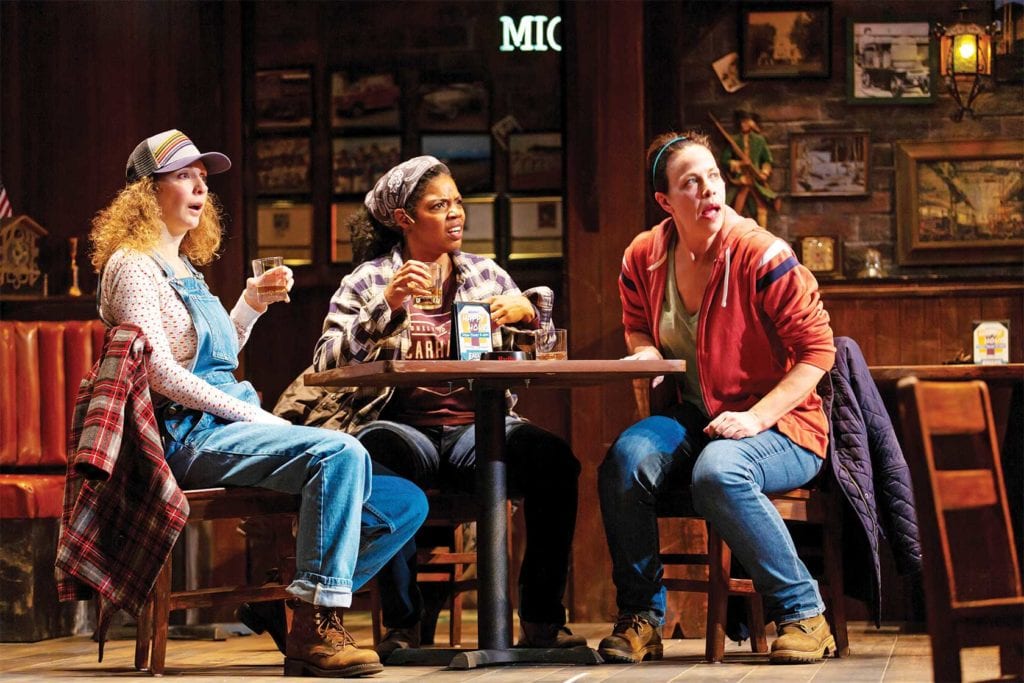‘Sweat’ a riveting study of a factory community wrenched apart
The Huntington Theatre Company's production is crushingly current

Lynn Nottage’s prophetic 2015 play, “Sweat,” could have been a bellwether of the 2016 election. Her Pulitzer Prize-winning work portrays a plight faced by a broad swath of Americans either ignored or manipulated by the candidates. “Sweat” follows a group of friends, lifelong residents of a factory town, as their lives are pulled apart when the local plant shuts down.
Nottage set her play in Reading, Pennsylvania, designated by the 2011 census as the poorest city in America by size, after spending months interviewing its residents.
The Huntington Theatre Company’s riveting production of “Sweat,” running at the Huntington Avenue Theatre in Boston through March 1, is crushingly current. Yet, it goes beyond a rendering of working-class suffering in an economy that favors the top 1 percent. In its tough truths, “Sweat” tells a more universal and tragic story through its eight characters.
Directed masterfully by Kimberly Senior, the two-hour production with one 10-minute intermission brings “Sweat” to searing life with the alchemy of fine staging and committed performances by a strong cast.
Throughout the two-act play, scenes shift frequently between 2000 and 2008. As scenes and years change, scenic designer Cameron Anderson’s mobile sets move forward and then recede from view like the ebb and flow of time and memory. A vintage barroom is a home-away-from-home for the friends. The meeting room of a parole officer is bare and grey, narrow like a confessional. Visible side-by-side are living rooms that frame two very different encounters between a mother and a son newly released from prison.
Agile lighting by D.M. Wood heightens closeups of individual characters as well as telling details in action-packed scenes. Costume designer Junghyun Georgia Lee’s outfits include workaday garb for the friends — jeans, hoodies and plaid shirts, emboldened by expressive T-shirts — and trim professional attire for the parole officer. The sound design by Pornchanok Kanchanabanca underscores tense moments with original music, and as scenes open, injects clips from actual newscasts to mark shifts between 2000 and 2008.
The compelling opening scene introduces Jason and Chris, in their late 20s, as each man is interviewed by a parole officer, played with cool intensity by Maurice Emmanuel Parent. Shane Kenyon is credible as the taut and distressed Jason, who has branded his face with a swastika and seems clueless as to how he has lost his way. Brandon G. Green fully inhabits the vulnerability and sincerity of Chris. He and Jason, once close friends, have done a terrible deed that landed them in prison. Now candidates for release, both men are marked deeply by their shared memory.
The scene shifts to the barroom presided over by Stan, the barkeeper. Guy van Swearingen’s Stan is a relaxed and strong figure as he tends to his unruly patrons, offering each a kind and honest hearing and seeing both sides of a charged situation.
Taking over the bar are three women, longtime friends, who are celebrating a birthday in manner they have evidently done many times: Tracey, Jason’s mother, wears a rhinestone tiara and passes around cake and drinks. Jennifer Regan embodies Tracey’s ferocity, whether drunk and dancing with her friends, or later, as jobs and livelihoods are lost and she becomes locked in rage and regret, her lower lip curled in anger. Cynthia, the mother of Chris, is played with warm authority by Tyla Abercrumbie, who conveys her character’s tenderness and resilience. Unlike Tracey, she is a striver, and receives a promotion that removes her from her friends on the assembly line.
Flopped over at a table is Jessie, played by Marianna Bassham, who enlivens her underdrawn character, a nonstop drunk, with a comic touch, and renders with poignance Jessie’s one moment of plain talk. When her turn comes to wear the birthday tiara, Stan asks Jessie what she wants for her birthday. She simply replies, “I want a kiss.”
Seen wiping tables and guiding Jessie to the bathroom, but not yet heard, is Oscar, Stan’s hard-working helper. Tommy Rivera-Vega invests Oscar, a young Colombian-American, with dignity and readiness to stand up for himself.
The first act slackens during the party scene, which goes on a bit too long, as these yet-unknown characters go about their rowdy horseplay. But things get more interesting as, through one-to-one exchanges, the characters take on heft. Chris turns out to be a striver, like his mother, and confesses to a scornful Jason his ambition to attend the local teacher’s college. Cynthia’s estranged husband, Brucie, wanders in and for a few minutes succeeds in stirring up her affection. Played convincingly by Alvin Keith, Brucie, once an outspoken leader, is now a broken man who begs for drinks.
As Oscar takes a break on the back stoop of the barroom, he finds Tracey there and reluctantly, she offers him a cigarette. They begin to talk. Tracey tells him of her German grandfather, a master woodworker, and learns that Oscar was, like her, born and raised in Reading.
In Act 2, the workers go on strike, characters take sides, and positions polarize and harden into a zero-sum game in which one’s gain is another’s loss. Norms of decency and community are lost in the fray. But “Sweat” concludes with a note of redemption and reconciliation, as some characters emerge with new, hard-won understanding. If only our nation and its political leaders can do the same.







